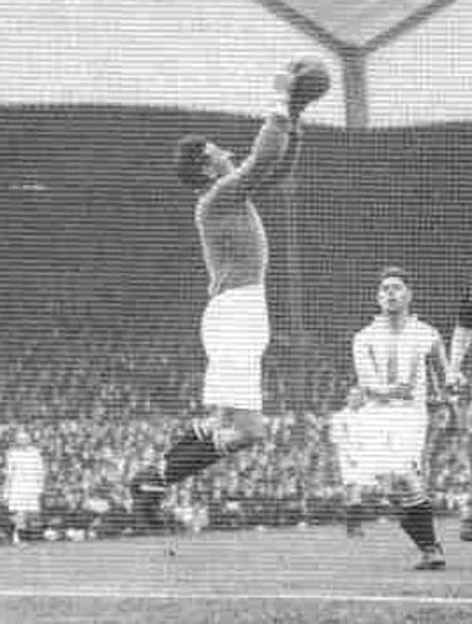

Potts: James Forster (Jimmy)
1926-1934
(Player Details)
Goalkeeper
Born: Ashington: 25-02-1899
Debut: v Huddersfield Town (a): 27-02-1926
6’1” 12 st 0lb (1930)
Potts was probably United’s best goalkeeper of the inter-war period. He was the
brother-in-law of the Milburns, his sister Bella having married Jack Milburn. He joined
Blyth Spartans at the age of sixteen and played for them for three years while he worked as
a coal-hewer at Ashington Colliery. His occupation was one of the most dangerous jobs down
the pit but it helped build his unique physique and he was known to have hands like shovels.
He remained the main stay of the Spartans side until February 1926, when Leeds United made
an approach for his services. In late February 1926, the Blyth officials meet with Leeds
officials and a £200 fee was agreed for his signature and Potts signed professional terms.
He made his debut within two days of signing. The two full backs in front of him were George
and Jackie of the famous Ashington football family of the Milburns. The trio became known in
football as the Ashington Defence. He became firmly established at Elland Road, using his
marvellous physique to dominate the penalty area. After making his debut, he played
eighty-five consecutive League and Cup games before injury saw him sidelined almost two years
later. In his first two full seasons he saw United be relegated and promoted back to Division
One as United established themselves as a "yo-yo team". Arthur Fairclough had certainly been
impressed when he brought the promising Blyth Spartans goalkeeper to Leeds, giving him an
immediate debut at Huddersfield Town, and in his dozen appearances towards the end of the
1925-26 campaign he had helped Leeds secure their First Division status with four priceless
wins and four clean sheets. Since gaining First Division status at the end of the 1923-24
season Leeds had struggled and it came as no surprise when they were relegated at the end of
the 1926-27 season. During the ensuing close season, Dick Ray replaced Arthur Fairclough, and
he kept faith with the new goalkeeper at the start of the new season. Throughout that 1927-28
season, promotion always looked to be imminent as two glorious runs, one of nine games, from
10th December 1927 to 28th January 1928 and the con of eleven games from 18th February 1928 to
21st April 1928, was the basis of success of that season. A one goal defeat in the last home
game by Manchester City cost the title, as Leeds finished runners-up. Potts had been
sensational and had kept eighteen clean sheets, which included a nine game run during the
eleven match unbeaten spell in which he held the opposition scoreless. Back in the First
Division, after a season of consolidation in 1928-29, Leeds surprised many teams by finishing
the 1929-30 campaign in fifth place, their highest position since formation. They also
recorded a club-record 8-1 win in the F.A. Cup against Crystal Palace. It was felt Leeds
could challenge for the title, but the 1930-31 season proved to be a disaster. On occasions,
Leeds could annihalate opponents, twice recording seven goal hauls and on of five, but most
of their campaign was inconsistent. Relegation, which had always threatened as United spent
much of the season in twenty-first spot was confirmed on the last day of the season, when,
although United defeated sixth place Derby County 3-1 at Elland Road, Blackpool got the point
they needed in a 2-2 draw with Manchester City at Bloomfield Road. United were back at the
first attempt. Nine consecutive wins, in an unbeaten run of fifteen games, including seven
clean sheets in the autumn set them on their way, but poor form during the run-in, when they
only managed two wins in ten games, meant they had to settle for runners-up spot again. A
firm favourite with supporters, and for eight seasons he was the accepted first choice keeper.
A commanding keeper he dominated the box and was a great anticipator of crosses, Potts was a
consistent performer for many seasons. He was eventually replaced by the younger Stan Moore
towards the end of the 1932-33 campaign. With no return in sight, Potts joined Port Vale in
May 1934, at the age of thirty-five, and stayed at Port Vale for a couple of seasons, making
his debut in a 2-0 home win over Sheffield United on 25th August 1934. He hardly missed a
game, amassing eighty-two League appearances and four F.A. Cup ties in that time. He was
released by Port Vale at the end of the 1935-36 season and finished his career at Workington
before returning home to Ashington to take up a job back at the Colliery. He died in
Northumberland on 1st October 1986.